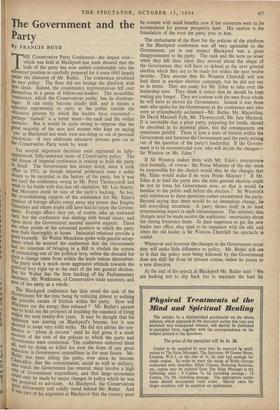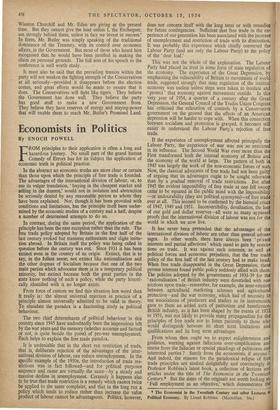The Government and the Party
BY FRANCIS BOYD HE Conservative Party Conference—the largest ever—
which was held at Blackpool last week showed that the
bulk of the party has now settled comfortably into the advanced position so carefully prepared for it since 1945 largely under the direction of Mr. Butler. The conference produced 90 new policy. The floor did not besiege the platform with new ideas. Indeed, the constituency representatives fell over themselves in a game of follow-our-leaders. The monolithic Conference, which the Conservatives prefer, has its disadvan- tages. It can easily become deadly dull, and it misses a Splendid opportunity to carry to the public outside the educative process by which the leaders have converted— Perhaps ' trained' is a better word—the rank and file within barracks. But it would be quite wrong to suppose that the Feat majority of the men and women who kept on saying Yes' at Blackpool last week were not doing so out of personal conviction. A very elaborate educative process goes on in the Conservative Party week by week.
Yet several important decisions were registered as fully- Understood:fully-endorsed items of Conservative policy. The
91d dream of imperial preference is ceasing to hold the party in thrall. The Government has always acted, since it took office in 1951, as though imperial preference were a noble
dream to be recorded in the history of the party, but it was not until the conference swung to Mr. Peter Thorneycroft last Week in his battle with that fine old champion, Mr. Leo Amery, that Ministers could be sure of the party's backing. So too, the overwhelming support of the conference for Mr. Eden's conduct of foreign affairs swept Away any power that Empire Crusaders and others might still have had to injure the Govern- ment. Foreign affairs may yet, of course, take an awkward tam, but the conference was dealing with broad issues, and upon these the Government secured massive support. There are other points of the advanced position in which the party now feels thoroughly at home. Industrial relations provide a good example. Sir Walter Monckton spoke with general accep- tance when he assured the conference that the Government had no intention of bringing in a Bill to abolish the system of contracting out of the political levy, unless the demand for such a change came from within the trade unions themselves. The. party took a much more aggressive attitude towards the Mica' levy right up to the start of the last general election. But Sir Walter has the firm backing of his Parliamentary Secretary, Mr. Watkinson, of Conservative trade unionists, and now of the party as a whole. Government The Blackpool conference has thus eased the task of the „_`-lovernment for the time being by reducing almost to nothing g rt, possible causes of friction within the party. How will o "ousters use the energy thus released ? Mr. Butler's answer 7, Was to hold out the prospect of doubling the standard of living le _Within the next twenty-five years. It may be thought that his 1. optimism was soaring on Blackpool's breezes, but it was it , moored to some very solid rocks. He did not advise the con- ference to ' inkiest in success' until he had given it a stark account of the cost of the policies to which the party and Government were committed. The conference endorsed them suction and by doing so killed for ever the hope of any great s Sutler in Government expenditure in the near future. Mr. if nti!itler, has been telling the party, ever since he become s. taancellor, that the commitments, social as well as military, D. . ,,,, which the Government has entered, must involve a high le p„4414 of Government expenditure, and that large economies 10 could only .be made by major changes in policy which he was
/ "u! prepared to advocate. At Blackpool, the Conservatives
quite deliberately and solidly stood behind Mr. Butler. And ” Was part of his argument at Blackpool that the country must be content with small benefits now if the resources were to be accumulated for greater prosperity later. His caution is the foundation of the trust the party puts in him.
The enthusiasm of the floor for the policies of the platform at the Blackpool conference was all very agreeable to the Government, yet in one respect Blackpool was a great disappointment to the party. The rank and file were no wiser when they left than when they arrived about the shape of the Government they will have to defend at the next general election which they are to be ready for within the next twelve months. They assume that Sir Winston Churchill will not lead them in another election campaign, but he did not say so in terms. They are ready for Mr. Eden to take over the leadership now. They think it unfair that he should be kept waiting any longer. They are content with the men from whom he will have to recruit his Government. Indeed it was these men who spoke for the Government at the conference and who were so triumphantly acclaimed—Mr. Butler, Mr. Macmillan, Sir David Maxwell Fyfe, Mr. Thorneycroft, Mr. lain Macleod. It is inevitable that a great party, preparing for battle, should be absorbed in its electoral plans, but the consequences are sometimes painful. There is now a state of tension within the Government and between the Government and the party arising . out of the question of the party's leadership. If the Govern- ment is to be reconstructed now, who will decide the changes— Sir Winston or Mr. Eden ?
If Sir Winston makes them with Mr. Eden's concurrence (not formally, of course : the Prime Minister of the day must be responsible for the choice) would they be the changes that ,Mr. Eden would make if he were Prime Minister ? If Mr. Eden is to lead the party into the next general election ought he not to form his Government now, so that it would be familiar to the public well before the election ? Sir Winston's only references to these questions rather exasperated the party. Beyond saying that there would be no immediate change, he left everything uncertain. A party shows itself is its least prepossessing aspect in such circumstances. The certainty that changes must be made excites the ambitious: uncertainty about the timing frustrates them. In their eagerness to get the new leader into office, they tend to be impatient with the old, and when the old leader is Sir Winston Churchill the spectacle is sordid.
Whenever and however the changes in the Government occur they will make little difference to policy. Mr. Butlei will see to it that the policy now being followed by the Government does not shift far from its present course, unless he points to a new direction.
At the end of his speech at Blackpool Mr. Butler said,: We are looking not to slip back but to maintain the lead Sir Winston Churchill and Mr. Eden are giving at the present time. But they cannot give the lead unless I, the Exchequer, am strongly behind them, unless in fact we invest in success' In form, Mr. Butler was simply speaking of the traditional dominance of the Treasury, with its control over economic affairs, in the Government. But most of those who heard him recognised that, he would have been justified in making the claim on personal grounds. The full text of his speech to the conference is well worth study.
It must also be said that the prevailing tension within the party will not weaken the fighting strength of the Conservatives at all seriously—provided it disappears before the election comes, and great efforts would be made to ensure that it does. The Conservatives will fight like tigers. They believe the Government has done well. They believe the party has good stuff to make a new Government from. They believe they have reserves of energy and staying-power that will enable them to reach Mr. Butler's Promised Land.



































 Previous page
Previous page